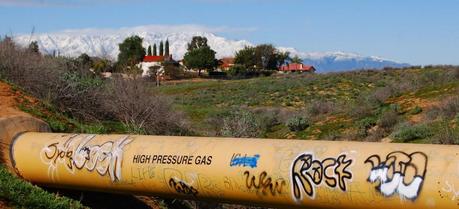 Microbes may play an important role in mitigating the effects of methane and other gases. On the photo: A gas pipeline through Sycamore Canyon Park, Riverside, California. (Credit: Flickr @ Daniel Orth https://www.flickr.com/photos/danorth1/)
Microbes may play an important role in mitigating the effects of methane and other gases. On the photo: A gas pipeline through Sycamore Canyon Park, Riverside, California. (Credit: Flickr @ Daniel Orth https://www.flickr.com/photos/danorth1/)Bacteria could mop up naturally-occurring and man-made leaks of natural gases before they are released into the atmosphere and cause global warming—according to new research from the University of East Anglia.
Findings published in the journal Nature (see footnote) shows how a single bacterial strain (Methylocella silvestris) found in soil and other environments around the world can grow on both the methane and propane found in natural gas.
It was originally thought that the ability to metabolize methane and other gaseous alkanes such as propane was carried out by different groups of bacteria. This new finding is important because it means that one type of bacteria can mop up the components of natural gas very efficiently and reduce pollution.
The findings could help mitigate the effects of the release of greenhouse gases to the atmosphere from both natural gas seeps in the environment and those arising from man-made activity such as fracking and oil spills.
Researchers studied the bacterium Methylocella which is normally found in peat, tundra, and forest soils in Northern Europe. This type of bacterium has also been found among the microbial community following the Deepwater Horizon oil spill in 2010. They then measured its ability to grow on methane and other gases.
Lead researcher Prof Colin Murrell, from UEA’s school of Environmental Sciences, said: “Natural gas from geological sources contains methane, as well as substantial quantities of ethane, propane and butane.
“We have shown that one microbe can grow on both methane and propane at a similar rate. This is because it contains two fascinating enzyme systems which it uses to harness both gases at once.
“This is very important for environments exposed to natural gas, either naturally or through human activity. These microbes may play an important role in mitigating the effects of methane and other gases before they have a chance to escape into the atmosphere.
“These findings could be used to inform land use management decisions. For example areas where high levels of methane and propane are released could benefit from an environment rich in these microbes, which live naturally in soil.
“Methane is a potent greenhouse gas which is released from natural sources such as wetlands, as well as from human activities including waste management, the oil and gas industries, rice production and livestock farming. Globally, it is estimated that more than half of methane emissions are man-made.
“Molecule-for-molecule, the effect of methane on global warming is more than 20 times greater than carbon dioxide over a 100 year timeframe. It is therefore very important that we understand how it can be removed biologically in the environment before it is released into the atmosphere.”
The research was funded by the Natural Environment Research Council (NERC) and the Norwich Research Park Earth and Life Systems Alliance.
Crombie, A., & Murrell, J. (2014). Trace-gas metabolic versatility of the facultative methanotroph Methylocella silvestris Nature DOI: 10.1038/nature13192
